Ewing Juliana Horatia Gatty
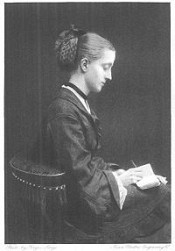
Juliana Horatia Ewing (née Gatty) (1841–1885) was an English writer of children's stories. She was the second of ten children of the Reverend Alfred Gatty, the vicar of Ecclesfield in Yorkshire, and Margaret Gatty, who was herself a children's author. On 1 June 1867, she was married to Major Alexander Ewing (1830-1895) of the army pay department. Within a week of their marriage, Ewing left England for Nova Scotia, Canada, where her husband had received a new posting. They remained there for two years, before returning to England in 1869. Though her husband was sent overseas again, to Malta in 1879 and Sri Lanka in 1881, her poor health would not allow her to accompany him. In 1885, she moved to Bath, in the hopes that the change of air would do her good. However, her health continued to deteriorate, and after an unsuccessful operation, she died there on 13 May 1885. She was given a military funeral at Trull, Somerset, three days later. Roger Lancelyn Green calls her works the "first outstanding child-novels" in English literature.[1] Among her works, which are notable for their sympathetic insight into child-life, their admiration for military life, and their reflection of her strong Anglican faith, are: Mrs. Overtheway's Remembrances (1869), A Flat Iron for a Farthing (1872), Six to Sixteen (1875), Jan of the Windmill (1876), Jackanapes (1884), and The Story of a Short Life (1885). A talented artist herself, her works were frequently illustrated by such notables as George Cruikshank and Randolph Caldecott. She was also the editor of a number of magazines which published short stories for children, such as the Nursery Magazines from 1856 onwards, the Monthly Packet and the monthly Aunt Judy's Magazine from 1866. This article incorporates public domain text from: Cousin, John William (1910). A Short Biographical Dictionary of English Literature. London, J. M. Dent & sons; New York, E. P. Dutton.
do you like this author?
What readers are saying
What do you think? Write your own comment on this book!
write a commentWhat readers are saying
What do you think? Write your own comment on this author!
write a commentBook list

A Flat Iron for a Farthingor Some Passages in the Life of an only Son
Series:
Unknown
Year:
Unknown
Raiting:
3.5/5
Show more
add to favoritesadd In favorites

Mary's MeadowAnd Other Tales of Fields and Flowers
Series:
Unknown
Year:
Unknown
Raiting:
3.5/5
Show more
add to favoritesadd In favorites
Book list

A Flat Iron for a Farthingor Some Passages in the Life of an only Son
Series:
Unknown
Year:
Unknown
Raiting:
3.5/5
Show more
add to favoritesadd In favorites

Mary's MeadowAnd Other Tales of Fields and Flowers
Series:
Unknown
Year:
Unknown
Raiting:
3.5/5
Show more
add to favoritesadd In favorites
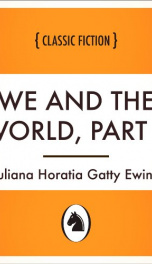
We and the World, Part II
Series:
Unknown
Year:
Unknown
Raiting:
2.5/5
I have often thought that the biggest bit of good luck (and I waslucky), which befell me on my outset into the world, was that the man Isat next to in the railway carriage was not a rogue. I travelled thirdclass to Liverpool for more than one reason--it was the cheapest way,besides which I did not wish to meet any family friends--and the man Ispeak of was a third-class passenger, and he went to Liverpool too.At the time I was puzzled to think how he came to guess that I wasrunning away, that I had money with me, and that I had never been toLiverpool before; but I can well imagine now how my ignorance andanxiety must have betrayed themselves at every station I mistook for theend of my journey, and with every question which I put, as I flatteredmyself, in the careless tones of common conversation, I really wonder Ihad not thought beforehand about my clothes, which fitted very badly onthe character I assumed, and the company I chose; but it was not perhapsto be expected that I should know then, as I know now, how conspicuousall over me must have been the absence of those outward signs ofhardship and poverty, which they who know poverty and hardship know sowell.
Show more
add to favoritesadd In favorites
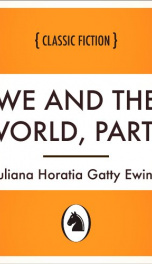
We and the World, Part I
Series:
Unknown
Year:
Unknown
Raiting:
3.5/5
It was a great saying of my poor mother's, especially if my father hadbeen out of spirits about the crops, or the rise in wages, or ourprospects, and had thought better of it again, and showed her the brightside of things, "Well, my dear, I'm sure we've much to be thankful for."Which they had, and especially, I often think, for the fact that I wasnot the eldest son. I gave them more trouble than I can think of with acomfortable conscience as it was; but they had Jem to tread in myfather's shoes, and he was a good son to them--GOD bless him for it!I can remember hearing my father say--"It's bad enough to have Jackwith his nose in a book, and his head in the clouds, on a fine Juneday, with the hay all out, and the glass falling: but if Jem had been alad of whims and fancies, I think it would have broken my poor oldheart."
Show more
add to favoritesadd In favorites
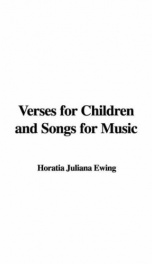
Verses for Children
Series:
Unknown
Year:
Unknown
Raiting:
3/5
Illustrated collection of poms and songs by the prolific author of children's stories. Her tales, which have hardly been excelled in sympathetic insight into childlife, still enjoy undiminished popularity. --This text refers to the Paperback edition.
Show more
add to favoritesadd In favorites
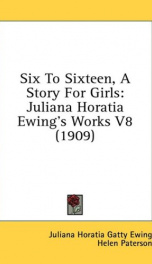
Six to Sixteen
Series:
Unknown
Year:
Unknown
Raiting:
4.5/5
A Story for Girls --This text refers to the Paperback edition.
Show more
add to favoritesadd In favorites

The Peace Egg and Other tales
Series:
Unknown
Year:
Unknown
Raiting:
3/5
Collection of short stories first published in 1894 by the prolific author of children's stories. Her tales, which have hardly been excelled in sympathetic insight into childlife, still enjoy undiminished popularity. --This text refers to the Paperback edition.
Show more
add to favoritesadd In favorites
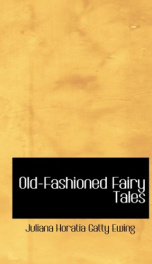
Old-Fashioned Fairy Tales
Series:
Unknown
Year:
Unknown
Raiting:
3/5
Collection of old-fashioned fairy tales, first published in 1882, by the prolific author of children's stories. Her tales, which have hardly been excelled in sympathetic insight into childlife, still enjoy undiminished popularity. --This text refers to the Paperback edition.
Show more
add to favoritesadd In favorites
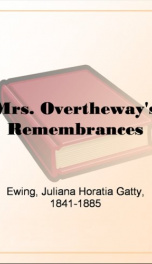
Mrs. Overtheway's Remembrances
Series:
Unknown
Year:
Unknown
Raiting:
4/5
This book was converted from its physical edition to the digital format by a community of volunteers. You may find it for free on the web. Purchase of the Kindle edition includes wireless delivery.
Show more
add to favoritesadd In favorites
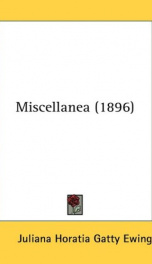
Miscellanea
Series:
Unknown
Year:
Unknown
Raiting:
4.5/5
Illustrated children's book first published in 1868 by the prolific author of children's stories. Her tales, which have hardly been excelled in sympathetic insight into childlife, still enjoy undiminished popularity. --This text refers to the Paperback edition.
Show more
add to favoritesadd In favorites
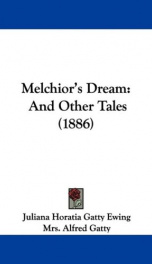
Melchior's Dream and Other Tales
Series:
Unknown
Year:
Unknown
Raiting:
4/5
Collection of short stories first published in 1877 by the prolific author of children's stories. Her tales, which have hardly been excelled in sympathetic insight into childlife, still enjoy undiminished popularity. --This text refers to an alternate Paperback edition.
Show more
add to favoritesadd In favorites
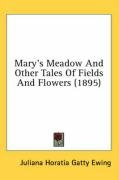
Mary's Meadow
Series:
Unknown
Year:
Unknown
Raiting:
3/5
Collection of short stories first published in 1886 by the prolific author of children's stories. Her tales, which have hardly been excelled in sympathetic insight into childlife, still enjoy undiminished popularity. --This text refers to an alternate Paperback edition.
Show more
add to favoritesadd In favorites

Last Words
Series:
Unknown
Year:
Unknown
Raiting:
4/5
Purchase of this book includes free trial access to www.million-books.com where you can read more than a million books for free. This is an OCR edition with typos. Excerpt from book: SNAP-DRAGONS. A Tale Of Christmas Eve. Mr. And Mrs. Skratdj. Once upon a time there lived a certain family ot the name of Skratdj. (It has a Russian or Polish look, and yet they most certainly lived in England.) They were remarkable for the following peculiarity. They seldom seriously quarrelled, but they never agreed about anything. It is hard to say whether it were more painful for their friends to hear them constantly contradicting each other, or gratifying to discover that it " meant nothing," and was " only their way." It began with the father and mother. They were a worthy couple, and really attached to each other. They had a habit of contradicting each other's statements, and opposing each other's opinions, which, though mutually understood and allowed for in private, was most trying to the by-standers in public. If one related an anecdote, the other would break in with half-a-dozen corrections of trivial details of no interest or importance to anyone, the speakers ineluded. For instance : Suppose the two dining in a strange house, and Mrs. Skratdj seated by the host, and contributing to the small-talk of the dinner-table. Thus : "Oh yes. Very changeable weather indeed. It looked quite promising yesterday morning in the town, but it began to rain at noon." "A quarter past eleven, my dear," Mr. Skratdj's voice would be heard to say from several chairs down, in the corrective tones of a husband and father; " and really, my dear, so far from being a promising morning, I must say it looked about as threatening as it well could. Your memory is not always accurate in small matters, my love." But Mrs. Skratdj had not been a wife and a mother for fifteen years, to be snuffed out at one snap of the marital snuffers. As Mr. Skratdj leaned forward in his chair, she...
Show more
add to favoritesadd In favorites
What readers are saying
What do you think? Write your own comment on this author!
write a commentif you like Ewing Juliana Horatia Gatty try:
readers also enjoyed
What readers are saying
What do you think? Write your own comment on this author!
write a commentGenre
if you like Ewing Juliana Horatia Gatty try:
readers also enjoyed
Do you want to read a book that interests you? It’s EASY!
Create an account and send a request for reading to other users on the Webpage of the book!

